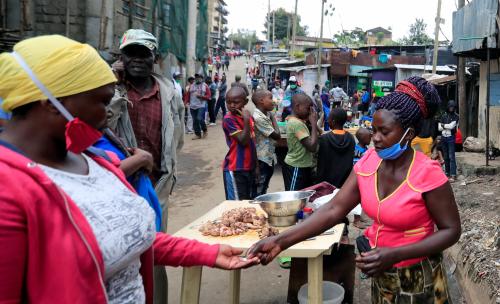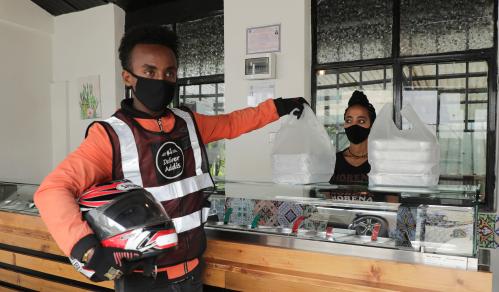To get a closer look at the COVID-19 pandemic’s effect on African businesses, on June 6, the World Bank published a policy brief analyzing the results of a telephone survey examining the impact of COVID-19 on Ethiopian firms based in the country’s capital, Addis Ababa. The survey, which solicited responses from 550 firms between May 6 and May 27, was the second in a series conducted by the World Bank and the Ethiopian Jobs Creation Commission to monitor the impact of COVID-19 on formal firms in Ethiopia and inform policy responses to the pandemic.
As Figure 1 shows, firms in Addis Ababa report that the COVID-19 pandemic has affected their business mainly through a substantial decrease in demand for their products or services. The collapse in demand has increased since round one of the survey, when only 62 percent of all firms reported this effect of the pandemic on their businesses, compared to over 80 percent in round two. In contrast, the impact of other areas has declined since the first round of the survey, with fewer firms reporting an impact from forced closure of businesses, marketplaces, and shops, as well as restricted movement of workers. Notably, the impact of COVID-19 on firms varies depending on the sector of the firm. For example, firms in industry are more likely to be affected by lower supply and higher prices of raw materials and intermediate goods than firms in services, while firms in services are more likely to be affected by closures of businesses, marketplaces, and shops.
The policy brief states that since the first round of the survey, which took place between April 5 and May 5, firms in Addis Ababa have begun to resume operations, with the share of firms that completely halted operations decreasing from 41 percent in survey round one to 29 percent in round two. However, despite these reopenings, firms still face significant financial stresses, which have only increased over time. Figure 2 shows that while most firms report that the most significant financial problem they face is paying rent, financial stresses have increased across the board. In particular, payment of invoices as well as of staff wages and social security contributions have become substantially more difficult for firms since round one of the survey.
To address these issues, the survey also included questions about policy measures that would be helpful for firms to survive the COVID-19 crisis. The policy brief states that most firms indicated that waiving tax payments would be the most useful policy measure, followed by covering, reducing, or freezing operational costs and freezing or relieving debt payments.
For more on the impact of COVID-19 on African businesses, see Impact of COVID-19 on micro, small, and medium businesses in Uganda by Corti Paul Lakuma and Nathan Sunday.








Commentary
Figures of the week: Effects of COVID-19 on Ethiopian firms
June 11, 2020